Plato Unveiled - The Mind Behind 'The Republic' (427 - 347 B.C.)
Plato (c. 427–347 B.C.) was an ancient Greek philosopher and one of the most influential figures in Western philosophy. He was a student of Socrates and the teacher of Aristotle. Plato's philosophical works, written in the form of dialogues, explore a wide range of topics, including ethics, politics, metaphysics, epistemology, and the nature of reality. One of his most famous works is "The Republic." Here is an overview of Plato's life and contributions:
Early Life and Education:
Birth and Family:
Plato was born in Athens around 427 B.C. into an aristocratic family. His birth name was Aristocles, and Plato was a nickname referring to his broad shoulders or the breadth of his thought.
Student of Socrates:
Plato became a devoted student of Socrates, a philosopher known for his method of questioning and his commitment to the pursuit of virtue and knowledge.
Influence of Socrates:
Trial and Death of Socrates:
After the execution of Socrates in 399 B.C., Plato deeply reflected on the nature of justice, morality, and the role of the philosopher in society.
Philosophical Contributions:
Founding the Academy:
Around 387 B.C., Plato founded the Academy, an influential school of philosophy in Athens. It was the first institution of higher learning in the Western world.
Dialogues:
Plato's philosophical ideas are primarily conveyed through dialogues, written conversations between Socrates and other characters. The dialogues explore various philosophical questions and present different perspectives.
Major Works:
"The Republic":
"The Republic" is one of Plato's most famous dialogues. It discusses justice, the nature of the soul, and the ideal state. The allegory of the cave, where prisoners mistake shadows for reality, is a famous metaphor from this work.
"The Symposium":
This dialogue explores the nature of love and desire, featuring a series of speeches on the topic during a banquet.
"The Phaedo":
"The Phaedo" depicts the final moments of Socrates' life, focusing on his discussions about the immortality of the soul and the pursuit of wisdom.
"The Apology":
In this dialogue, Socrates defends himself during his trial, offering insights into his philosophy and the nature of virtue.
Theory of Forms:
Theory of Forms (Ideas):
One of Plato's key philosophical concepts is the Theory of Forms, suggesting that abstract, unchangeable "Forms" or "Ideas" represent the true reality behind the imperfect physical world.
Legacy:
Influence on Aristotle:
Plato's teachings had a profound impact on his student Aristotle, who would go on to become another towering figure in Western philosophy.
Philosophical Schools:
Plato's Academy continued to operate for centuries, and his ideas influenced various philosophical schools throughout history.
Death:
Death:
Plato died around 347 B.C. in Athens.
Plato's philosophical contributions have left an enduring legacy, shaping the course of Western thought. His dialogues, teachings, and the Academy played a crucial role in the development of philosophy, ethics, and political theory. Plato's exploration of fundamental questions about reality, knowledge, and morality continues to be studied and debated in contemporary philosophy.
-
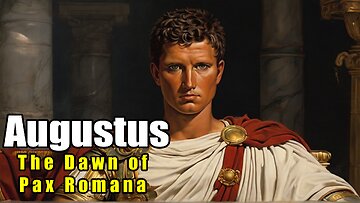 2:57
2:57
ALJangmaw
3 months agoAugustus: The Dawn of Pax Romana (63 B.C. - A.D. 14)
210 -
 7:24
7:24
Daily God Gems
4 months agoDon't Be Deceived
40 -
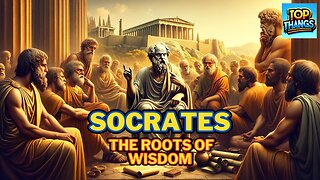 18:38
18:38
TopThangs
3 months agoSocrates: The Roots of Wisdom
97 -
 2:57
2:57
Kaatus
1 month agoTime isn't something to be feared or fought against
30 -
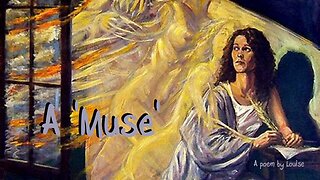 3:46
3:46
Louiseiology & Poetry
4 months agoA 'Muse'
821 -
 41:27
41:27
Straight Up, No Bullshit Podcast
4 months agoThe Truth Behind 'Ignorance is Bliss' - Episode #110
65 -
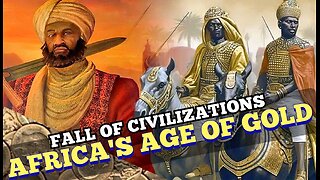 2:16:08
2:16:08
AndreCorbeil
3 months ago'Africa's Golden Empire! THE REAL 'WAKANDA' The 'Songhai' Empire. Fall Of Civilizations' West 'Africa'
6.2K7 -
 6:11
6:11
Daily God Gems
4 months agoThe Power of God's Word in Battle
59 -
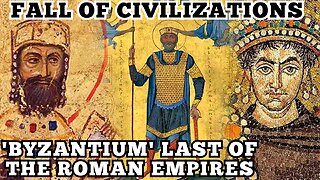 3:27:30
3:27:30
AndreCorbeil
4 months ago'Byzantium' "The Last Of The Roman Empire" 'Fall of Civilizations' The 'Byzantine' Empire Documentary
8.14K6 -
![[Secrets of Buenos Aires] Unravel the City's Mysteries Through Riddles #Buenos Aires #city #travel](https://hugh.cdn.rumble.cloud/s/s8/1/m/y/P/Z/myPZq.0kob-small-Secrets-of-Buenos-Aires-Unr.jpg) 7:49
7:49
Uncover Cities & Sights
1 month ago[Secrets of Buenos Aires] Unravel the City's Mysteries Through Riddles #Buenos Aires #city #travel
17